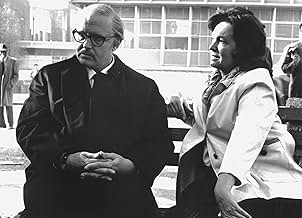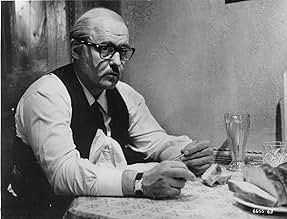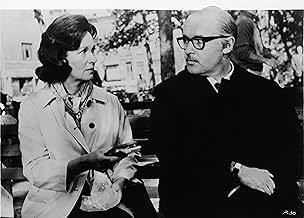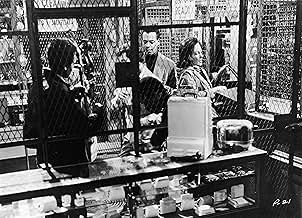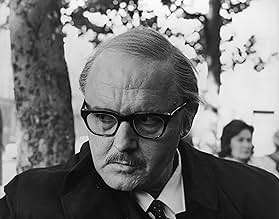Un prêteur sur gages juif, victime de la persécution nazie, perd sa foi dans l'humanité jusqu'à ce qu'il réalise trop tard les conséquences tragiques de ses actes.Un prêteur sur gages juif, victime de la persécution nazie, perd sa foi dans l'humanité jusqu'à ce qu'il réalise trop tard les conséquences tragiques de ses actes.Un prêteur sur gages juif, victime de la persécution nazie, perd sa foi dans l'humanité jusqu'à ce qu'il réalise trop tard les conséquences tragiques de ses actes.
- Réalisation
- Scénario
- Casting principal
- Nommé pour 1 Oscar
- 6 victoires et 10 nominations au total
- Jesus Ortiz
- (as Jaime Sanchez)
Avis à la une
I think there is something to be said for artists who invent and then convince everyone afterward that what they have just experienced is the way the world is put together.
Some filmmakers do this consistently. Or they do it once, and then just live in the world they've created. Others are amazingly clever at some point, and equally banal at others. Polanski comes to mind.
When this was new, it was groundbreaking, truly an achievement. It worked.
Lumet's approach is actor-centric, not something I particularly value. But it is perfect for an exploration of a man: world growing from an individual. Lumet also likes to use space, but he doesn't know the containment properties of space, only the dividers, so we have the shop will all sorts of walls and fences. The lover's apartment as well.
What was new was this was the first movie mainstream US movie to use nudity. Its underwhelming today thank heaven, but rather shocking in its day, especially because the woman is black, and a seller of sex.
In the project, it triggers the most extended flashback sequence, one that involved our hero's deepest disaster. Overlapping flashbacks had been used, most famously in "Manchurian Candidate," which resembles this in some ways. But it hadn't been so fragmented, so apparently integrated into the fabric of the man. We see a desperate whore; he sees his humiliated wife. We see street thugs beating up a drunk; he sees the holocaust.
This cinematic device is now so common as to not be remarkable. Sex (in the form of exposed breasts) and Nazis both had more cinematic power then than now.
Is it greater art if we digest it, even if the work itself becomes ordinary in the process? Seeing this will do to you what happens with the character we see. It will undress your memory, your cinematic memory. If you saw this when you were both young, it will give you a flashback, you living both now and then.
Ted's Evaluation -- 3 of 3: Worth watching.
played by Rod Steiger, is an aging Holocaust concentration camp survivor
running a pawnshop in New York. A young hispanic man who works in the
pawnshop looks up to Steiger's character, hoping to learn from the older man's years of experience and expertise in both financial and other business matters.
Steiger's character is emotionally closed throughout the entire length of the film. Jarrring flashbacks to the time when Nazerman was happy with his wife and two small children become increasingly menacing and tragic as the Nazi
domination and cruelty become more dominant. Steiger's character survives his family. The guilt attached to that survival haunts Nazerman as he numbly
proceeds throughout the present-day portions of the film.
This movie takes a huge risk even in it's premise because the title character is never really likable. You certainly have empathy for what Nazerman has
experienced in his life, but the harsh and dismissive way in which he treats both people close to him and the tragic figures who frequent his pawnshop leave you little choice but to have mixed feelings about this man.
Rod Steiger is excellent. It's incredible to think that less than three years later after playing this character, an elderly Jewish concentration camp survivor,
Steiger won an Oscar for his portraying southern bigoted police chief Bill
Gillespie in Norman Jewison's In the Heat of the Night.
Sidney Lumet's direction is excellent. The photography is a starkly shot black and white with a grainy almost documentary-type feel to it. The score by Quincy Jones is somewhat uneven, with inappropriate upbeat instrumentation intruding in to somber scenes.
All in all, a very good film, but definitely excruciatingly somber in tone.
Rod Steiger,a gifted actor, is at his very best here portraying Sol Nazerman, a pawnbroker who is completely shut down emotionally.
Through flashbacks, some fast, mostly slow, we see both the joy and subsequent horror of Sol's life in Nazi Germany, when his wife and children are swept into the camps and killed. Sol's deepest pain is that he survived and he carries it visibly. Nothing touches him. He is removed from humanity, living a life outside anyone else's.
This is never more exemplified than at his shop, where he is behind bars, often in shadow, while humanity moves outside, sometimes pleading with him, sometimes just wishing to make an emotional contact to no avail.
Brilliant black and white photography. Quincy Jones' music underscores this, it is jazzy 60s type of music, loud and vibrant, totally contrasting with the dark, dead world of Sol.
The supporting cast are terrific and the outdoor location shooting in New York is riveting. The movement of street life against the heaviness of Sol's plodding.
I still find it hard to believe that Rod lost the Oscar to Lee Marvin in the forgettable "Cat Ballou" (!!) that year.
This has to be seen by any serious lovers of movies. The last scene, done in one continuous take is heartbreaking, Sol finally getting in touch with the pain he has buried so deeply. Gut wrenching stuff. 9 out of 10.
Le saviez-vous
- AnecdotesRichard Sylbert's set was deliberately designed to be a series of cages--wire meshes, bars, locks, alarms, etc.--to symbolize that even though Sol was no longer in a concentration camp, he was effectively still imprisoned by his memories.
- GaffesAs Jesus runs down the street, his shirt changes from a V-neck to a turtle neck, and then back again.
- Citations
Jesus Ortiz: Say, how come you people come to business so naturally?
Sol Nazerman: You people? Oh, let's see. Yeah. I see. I see, you... you want to learn the secret of our success, is that right? Alright I'll teach you. First of all you start off with a period of several thousand years, during which you have nothing to sustain you but a great bearded legend. Oh my friend you have no land to call your own, to grow food on or to hunt. You have nothing. You're never in one place long enough to have a geography or an army or a land myth. All you have is a little brain. A little brain and a great bearded legend to sustain you and convince you that you are special, even in poverty. But this little brain, that's the real key you see. With this little brain you go out and you buy a piece of cloth and you cut that cloth in two and you go and sell it for a penny more than you paid for it. Then you run right out and buy another piece of cloth, cut it into three pieces and sell it for three pennies profit. But, my friend, during that time you must never succumb to buying an extra piece of bread for the table or a toy for a child, no. You must immediately run out and get yourself a still larger piece cloth and so you repeat this process over and over and suddenly you discover something. You have no longer any desire, any temptation to dig into the Earth to grow food or to gaze at a limitless land and call it your own, no, no. You just go on and on and on repeating this process over the centuries over and over and suddenly you make a grand discovery. You have a mercantile heritage! You are a merchant. You are known as a usurer, a man with secret resources, a witch, a pawnbroker, a sheenie, a makie and a kike!
Jesus Ortiz: [long pause] You really some teacher, Mr. Nazerman. You really, really 's the greatest.
Meilleurs choix
- How long is The Pawnbroker?Alimenté par Alexa
Détails
- Date de sortie
- Pays d’origine
- Langues
- Aussi connu sous le nom de
- The Pawnbroker
- Lieux de tournage
- 1642 Park Avenue, Manhattan, New York, États-Unis(Nazerman's pawn shop)
- Sociétés de production
- Voir plus de crédits d'entreprise sur IMDbPro
Box-office
- Budget
- 930 000 $US (estimé)
- Montant brut mondial
- 108 $US
- Durée1 heure 56 minutes
- Couleur
- Mixage
- Rapport de forme
- 1.85 : 1
Contribuer à cette page



